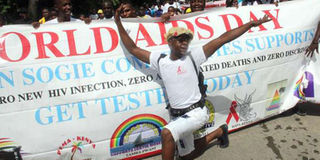Aids conference to begin in South Africa Monday

Kenyans participate in the World Aids day in Mombasa on December 1, 2015. There are 36.7 million people worldwide living with Aids, mainly in sub-Saharan Africa. Only 17 million are receiving treatment. PHOTO | LABAN WALLOGA | NATION MEDIA GROUP
What you need to know:
- Singer Elton John and Britain’s Prince Harry will host a session at the conference discussing the HIV epidemic in young people.
- The surge of energy from Durban helped launch a string of programmes to provide life-saving drugs for the Third World and dynamise research into new frontiers.
JOHANNESBURG
Sixteen years after Nelson Mandela galvanised the world to take up the fight against Aids, experts and activists return to the South African city of Durban on Monday, seeking to revitalise the battle.
Some 18,000 scientists, campaigners, funders and lawmakers are descending on the port city for the five-day 21st International Aids Conference — a council of war on a pandemic that has claimed more than 30 million lives in 35 years.
Singer Elton John and Britain’s Prince Harry will host a session at the conference discussing the HIV epidemic in young people.
“The message from Durban to the world is going to be that it is too soon to declare victory. We have a long way to go,” International Aids Society president Chris Beyrer told reporters.
Until 2000, only wealthier countries had hosted the biennial Aids meeting.
That changed when South Africa became the first developing country — and the first with an unbridled epidemic of HIV in its population — to take the helm.
The conference was a highly-charged affair, but its emotional zap transformed the Aids drive.
Campaigners fired verbal volleys at Big Pharma, accusing drug companies of providing life-saving drugs to HIV patients in rich countries but ignoring counterparts in poor economies.
And South African activists angrily levelled accusations of Aids-denialism at then-president Thabo Mbeki, who insisted the disease was caused by poverty, not HIV.
The star-studded cast in Durban was headed by Mbeki’s predecessor Mandela, who described the epidemic as one of the greatest threats humankind has faced.
The surge of energy from Durban helped launch a string of programmes to provide life-saving drugs for the Third World and dynamise research into new frontiers.
But 16 years after Durban, there are fears that HIV, by becoming a chronic but manageable, has become like wallpaper.
With no cure for the virus in sight, patients face lifelong reliance on expensive antiretroviral drugs.
This time, delegates will pore over the latest scientific research, amid frustration that there is still no vaccine for the virus.
The UN has set a target of ending the Aids pandemic by 2030, but warned that efforts were lagging.
Infection rates are rising in many regions of the world, Unaids agency said, with Russia especially hard hit.
There are 36.7 million people worldwide living with Aids, mainly in sub-Saharan Africa. Only 17 million are receiving treatment.





